
by jlansber | Oct 8, 2014 | Alumni Profiles, Features
Alumni Entrepreneurs
by Jennifer Leopoldt
Building any kind of business requires passion and hard work, but it also requires know-how and network connections. For more than three decades, the highly regarded entrepreneurship education program at DePaul’s Driehaus College of Business has been helping its graduates blend these ingredients together to achieve success.
“You just don’t fall into a successful business. It takes originality, insight, research, training and perseverance,” says Harold Welsch (BUS ’66, MBA ’68), founder and director of DePaul’s entrepreneurship program and the Coleman Foundation Chair in Entrepreneurship.
DePaul’s approach has received national recognition, most recently from The Princeton Review, which rated DePaul’s undergraduate program as 15th and the graduate program as 20th in this year’s ranking of the best colleges for entrepreneurs. In a field of 3,000 participating schools, that puts DePaul in the top 1–2 percent in the United States.
The college’s entrepreneurship program began in 1982, and Welsch says the discipline is even more popular today. “We teach our students to be constantly aware of new opportunities by applying their creativity and innovativeness to adapt to new markets,” says Welsch.
Entrepreneurship is about more than startups. As the following stories show, lessons alumni learn at DePaul can be applied to jobs as disparate as running a family business, founding a nonprofit and helping companies expand.
 Bailey Glendenning, CEO of Glendenning Brothers Inc. (MBA ’14)
Bailey Glendenning, CEO of Glendenning Brothers Inc. (MBA ’14)
For Bailey Glendenning, DePaul offered a hands-on program and concepts she could immediately use at her family’s business.
“The fun thing about my position is I could learn it in class on Tuesday night and walk into work to apply it on Wednesday,” she says.
Glendenning Brothers Inc., a transportation company in Stillman Valley, Ill., has been in business for 35 years, “but I view it as an entrepreneurial venture,” Glendenning says. “We’re trying to re-create our business, make it better, innovate and change.”
While earning her degree, Glendenning became fascinated by entrepreneurship after taking a class with Professor Welsch.
My perspective changed. I began to view all small business, whether startups or long-standing companies, as an opportunity to be entrepreneurial,” she says.
At DePaul, Glendenning met James Stark (MBA ’12, JD ’12), her business partner with whom she operates various other ventures through the startup C&H Financial Services Inc. She says DePaul taught her the importance of connecting with others. “You find out very quickly that you can’t do it all on your own. There are so many opportunities for business relationships, but you will never know if you don’t branch out and talk to people,” she says. Although running the family business is her main job, Glendenning says she really enjoys “the game of startups, where you can be completely creative.”
 William R. Snow, Managing Director, Jordan, Knauff & Co. (BUS ’89, MBA ’94)
William R. Snow, Managing Director, Jordan, Knauff & Co. (BUS ’89, MBA ’94)
William Snow studied finance at DePaul and later earned an MBA In entrepreneurship. He credits his education with providing insights and experience that help him connect with businesses that come to his investment banking firm. “I understand the issues that owners face as they try to grow their businesses or craft an exit,” he says.
Snow describes the work at Jordan, Knauff as selling companies, raising capital for companies and advising on acquisitions. “My favorite aspects of the job are what many people dislike the most—negotiating and resolving conflict,” he says.
Snow also is a speaker and an author. In addition to writing numerous articles, an e-book he wrote in 2003, “Venture Capital 101,” found online acclaim and eventually ended up at Wiley Publishing Inc. The publisher then contacted him about writing “Mergers & Acquisitions for Dummies.”
“The lesson is to find something to offer,” Snow explains. “Stop asking and think instead about the person on the other side of the bargain. What do they get out of an interaction with you? Offering will open far more doors than asking.”
In addition, Snow advises entrepreneurs to “gain actual, real-world experience. Classes and studying are great, but you have to get out and experience business situations for yourself.”
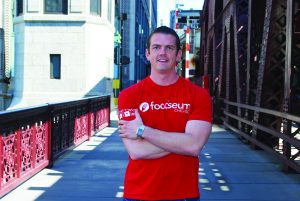 Kyle D. Joseph, Executive Director, Foodseum; Founder/CEO ShopGab (MBA ’12)
Kyle D. Joseph, Executive Director, Foodseum; Founder/CEO ShopGab (MBA ’12)
DePaul helped Kyle Joseph pivot from being an engineer to being an entrepreneur.
“I had a lot I wanted to create, and I wanted to make my ideas come to life,” he says. He calls DePaul’s program “an amazing experience that really transformed my career path and my life.”
Joseph’s first venture was ShopGab, which began as a social shopping platform that let consumers compare products. Now he’s relaunching it as a resource for personal shoppers and high-end boutiques, allowing professionals to manage and further engage customers.
His next project is Foodseum, a Chicago-based museum devoted to food and culture. “I’ve always had a love of exploring cultures through food, and I wanted to bring that experience to people,” Joseph says.
The museum will touch on the history, preparation and creative uses of different foods, with the first exhibit devoted to hotdogs and encased meats of the world. Until the museum has a permanent space, Joseph and his team are planning pop-up locations, starting in May 2015, when the prestigious James Beard Awards for food and beverage professionals come to Chicago. In the meantime, the team has established partnerships with more than 40 local and national organizations to help design the experience, build community awareness and raise the necessary funding for the Foodseum.
“It’s been exciting to be able to move at this incredibly accelerated pace, thanks to the network I formed through DePaul and ShopGab,” Joseph says.
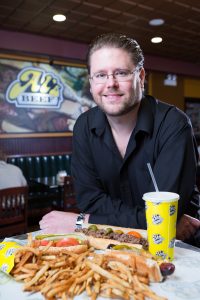 Michael Stadnicki, Co-Founder, Launch Franchise Development (BUS ’01, MBA ’11)
Michael Stadnicki, Co-Founder, Launch Franchise Development (BUS ’01, MBA ’11)
The entrepreneurial spirit has long characterized Michael Stadnicki’s work ethic.
While an undergraduate at DePaul, he won an international student business plan competition with his proposal for a wireless credit card payment system called ChargeAnywhere, which he later implemented in 750 Chicago taxicabs. After graduation, he worked at Francorp and Chicago Franchise Systems, the parent company of Al’s Italian Beef and Nancy’s Pizza. While developing the chains nationally, he returned to DePaul to further his goal of helping entrepreneurs develop through franchising.
“I’ve had the opportunity to work with all types of businesses—anything from a doggie daycare to restaurants overseas,” Stadnicki says.
Today he runs his own company, Launch Franchise Development, and operates a number of restaurants in Chicago, including the first U.S. location of the Big Cheese Poutinerie, a Canadian franchise that celebrates poutine, a traditional combination of French fries, fresh cheese curds and gravy. His company also works internationally and plans to open the first Middle East locations of Al’s Italian Beef and Nancy’s Pizza in Dubai in 2015.
Stadnicki, who was named the college’s Entrepreneur of the Year in 2010, urges other DePaul entrepreneurs to lean on the skills they learned in school and to adapt to change.
“Trust your instincts, trust the education that DePaul gave you, and follow your passion and your dream,” he says.
Read more about DePaul’s highly ranked entrepreneur programs.
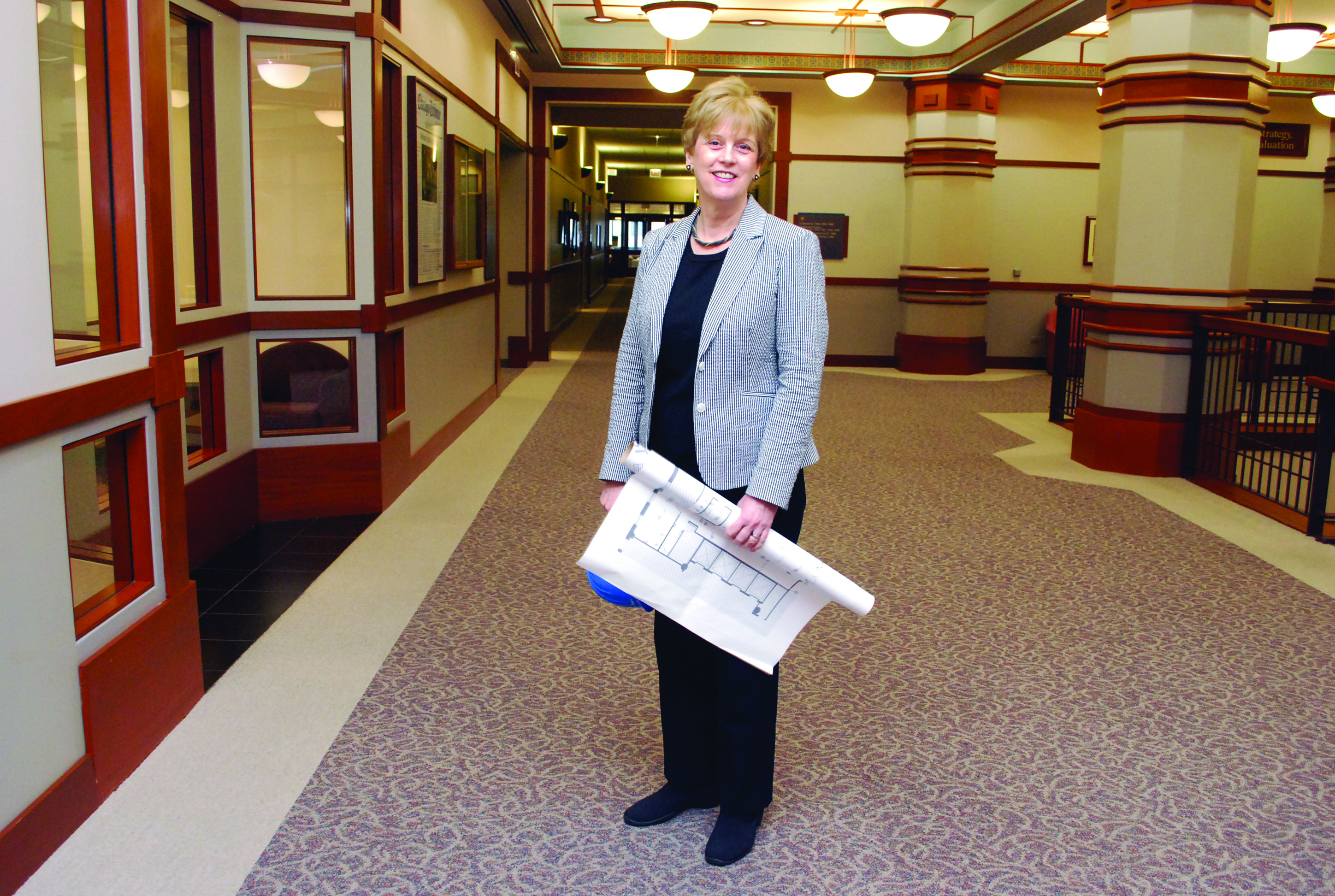
by jlansber | Oct 8, 2014 | Connections
DePaul’s New Startup Lab Will Link Students and Alumni Entrepreneurs
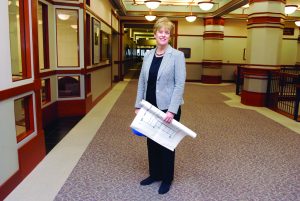
Terri Lonier, executive director of the Coleman Entrepreneurship Center
Imagine a space where business ideas meet execution and entrepreneur novices convene with seasoned business owners. The space would be dynamic, with tables and chairs on wheels that could be workstations one minute and audience seating for workshops and guest speakers the next.
The venue would be located in downtown Chicago, a city that has become a hotbed of entrepreneurship. For DePaul students and alumni entrepreneurs, such a space would be the place where dreams are made real.
Well, imagine no more.
DePaul, in collaboration with the Coleman Entrepreneurship Center at the
Driehaus College of Business, is launching a new entrepreneurial startup lab and co-working space in the DePaul Center on the Loop Campus. Set to open in 2015, the startup lab will provide a place for students to work on their new business ventures, alumni to connect, and members of the Chicago business community to network, says Terri Lonier, executive director of the Coleman Entrepreneurship Center.
“We are frequently contacted by alumni asking how they can get involved,” Lonier says. “This new startup lab will provide a physical space that will help them become more involved with entrepreneurial-minded students, network with other DePaul alumni, and connect with the Chicago entrepreneurial community. Even though they may have been out of school for a few years or even several decades, we want our alumni to be a part of the vibrant DePaul entrepreneurial family.”
The lab will differ from other co-working spaces that nurture startups downtown, Lonier says, because it will be student-focused and serve diverse business interests in the heart of the Loop. “Our startup lab will bring together a broad cross-section of individuals and ideas,” she says. “It is designed to be an entrepreneurial hub for the entire university.”

Preliminary startup lab rendering
Bridging the Gap
The lab is just one of many ways DePaul and its Coleman Entrepreneurship Center connect students and alumni with the resources they need to turn their business dreams into reality. Founded in 2003 with a grant from the Coleman Foundation, a Chicago-based organization that supports entrepreneurial education, the center partners with the university’s nationally ranked academic entrepreneurship program to provide a holistic environment for new venture development.
“We are the place where theory meets action,” says Lonier. “Our students learn valuable concepts in the classroom, and at the center it all comes together through application and practice.”
Lonier said the center’s purpose is to advise, inspire and connect students and alumni, helping them bridge the gap between an idea and a viable business venture. In addition, the center serves as a conduit for DePaul alumni to mentor, empower and encourage students to become leaders of business ventures.
“We host visiting entrepreneurs at workshops and informal sessions so that students can see what the entrepreneurship lifestyle is like,” Lonier says. “We also connect students with each other across the university, and with alumni, through either mentorships or work at startups. In addition, we connect alumni with each other and the wider Chicago business community by providing learning and networking opportunities.”
Among the alumni who have benefited from these connections is Ramzey Nassar (BUS ’13), founder of ThreadMeUp, a web platform used to design, order, crowd-fund or sell custom apparel. “The Coleman Entrepreneurship Center was a home away from home for me,” Nassar says, recalling his undergraduate years at DePaul studying entrepreneurship and developing business ideas. “Being a student and running a company can be tough, but finding that balance and having a place with mentors gave me the comfort to know I am not alone.”
Through DePaul, Nassar connected with several other alumni who now work with him at ThreadMeUp. This past summer, Nassar’s company worked with the center to provide an internship at ThreadMeUp for a DePaul undergraduate interested in entrepreneurship.
Many Ways to Connect
The Coleman Entrepreneurship Center produces or hosts a wide range of programs, events and networking opportunities.
These initiatives include:
Launch DePaul: An annual new venture competition where DePaul students and recent alumni present their business plans to a panel of professional investors and established entrepreneurs for the opportunity to win cash, awards and in-kind professional services. Alumni frequently are contest judges and help sponsor and support the competition.
Startup internship program: A summer internship program for students who want to work for Chicago-based startup companies. The program was launched this year with a grant from the John E. and Jeanne T. Hughes Foundation.
Student Innovation Awards: An annual student business idea competition that awards scholarships. The contest is sponsored by the entrepreneurship center’s advisory board members and co-hosted by DePaul’s Center for Creativity and Innovation.
Workshops and speaker events: These programs allow students to learn lessons from entrepreneurial DePaul alumni and Chicago startup founders.
The Launch DePaul competition, in particular, is a key way for alumni to engage with DePaul’s entrepreneurial ecosystem. Participants say the insights provided by the involvement of established entrepreneurs, many of them DePaul alumni, are priceless. “I’ve been on the other side and I know what it’s like to want that feedback,” says Launch DePaul judge
Greg Jaros (CDM ’86), a founder and CEO of Spare to Share, an online goods exchange. “That’s why I became a judge. I wanted to help other students get the feedback they need
to be successful.”
Such feedback is much appreciated by students like marketing major Bianca Perry. Her company, BBands, created with business partner and fellow DePaul student Jessica Weaver to market colorful headbands, was one of six finalists in the 2014 Launch DePaul competition. Perry says: “To send out your business pitch and have it critiqued by professionals and investors and to have them offer you suggestions and guidance on how to make your business better—it’s an invaluable experience.”
Want to learn more about entrepreneurship at DePaul? Visit the Coleman Entrepreneurship Center.
By Ovetta Sampson

by jlansber | Oct 8, 2014 | Notes from the Dean
 Alan Kay, the pioneering computer scientist, once said that “the best way to predict the future is to create it.”
Alan Kay, the pioneering computer scientist, once said that “the best way to predict the future is to create it.”
This advice is being embraced by a growing number of business school alumni worldwide. More than one in ten graduates from the classes of 1959 through 2013 are creating their own futures through entrepreneurship, according to a recent global survey of 21,000 business school alumni by the Graduate Management Admission Council. In addition, the longer they’ve been out of business school, the more likely they are to pursue this path. More than 23 percent of business school graduates who earned diplomas before 1990 are now business owners.
This trend applies to the Driehaus College of Business, where our robust and well-ranked entrepreneurship program has a rich history of preparing students for entrepreneurial opportunities. In our most recent career outcomes report, 11 percent of the Class of 2013 chose entrepreneurship/self-employment as their career path, up from 8 percent for the previous class. What’s more, an increasing number of DePaul alumni who don’t choose to start their own businesses are being recruited by startups.
In our Business Exchange Fall/Winter 2014 feature story, we explore these phenomena through the stories of DePaul business alumni who have used their entrepreneurship education to forge different paths to success. The coverage continues in our Connections section, where you’ll read about new initiatives at DePaul’s Coleman Entrepreneurship Center designed to help strengthen the links between students, alumni and the entrepreneur community in Chicago and beyond.
Our plans for new academic programs at the college embody the entrepreneurial spirit as well. This fall, we launched an Evening Cohort MBA program that develops individuals for senior positions in business, consulting and nonprofits through a curriculum that focuses on strategy, leadership and change management. This innovative program combines the best features of full-time and part-time MBA programs by allowing working professionals to experience the camaraderie and network-building benefits of taking all of their MBA classes together as a group, but in a convenient, accelerated after-work schedule.
As part of the Evening Cohort MBA program, we plan to launch a new biannual Charles H. Kellstadt Forum. This series of one-day events will bring together students, alumni and distinguished executives to discuss trends in leadership and management. At the forums, we will showcase current faculty research in conjunction with practical views on leadership and management from executives in Chicago and abroad. We look forward to sharing more about these plans as they unfold and hope you’ll gather ideas for your own future entrepreneurial endeavors at one of the forums.
Ray Whittington
Dean, Driehaus College of Business

by jlansber | Oct 8, 2014 | College News
Richard H. Driehaus (BUS ’65, MBA ’70, DHL ’02), the college’s namesake and chairman of Driehaus Capital Management, and William Farley, chairman and president of LV Ventures, Inc., presented guest lectures during this spring in the course, “Practical Investing: How to Make Money and Enjoy Doing It.”
The Department of Finance class, taught by Joel Litman (BUS ’93), chief investment strategist of Valens Securities, emphasized how to make money by using data to pick stocks.
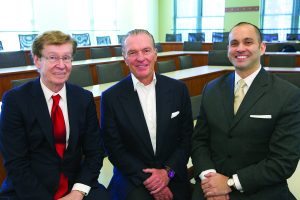
(L to R) Richard H. Driehaus, chairman of Driehaus Capital Management; and William Farley, chairman and president of LV Ventures, Inc., presented guest lectures in a finance class taught by Joel Litman.
Driehaus and Farley showed students how successful investors think. Driehaus stressed embracing change, and Farley emphasized that success takes persistence and courage.
DePaul’s ties to the elite investment community provide opportunities for unique learning experiences, Litman noted. “Students get to hear stories you can’t get in a textbook.”
Driehaus Dismisses Investing Myths
During his lecture, Driehaus outlined these nine approaches to investing that challenge popular investment paradigm.
1. Conventional advice: Buy low and sell high.
Driehaus advice: Buy high and sell even higher. “You want to buy stocks that have already had good moves and are doing well rather than take the risk on investing in a stock that is already in decline and hoping it goes up.”
2. Conventional advice: Just buy stocks of good companies and hold them so you don’t have to pay attention.
Driehaus advice: Buy good stocks and hold them, but monitor daily and get rid of things if there are bad changes.
3. Conventional advice: Don’t try to hit home runs; you make the most money buying singles.
Driehaus advice: No, you make the most on home runs—but you also need discipline.
4. Conventional advice: A high turnover strategy is risky.
Driehaus advice: It reduces risk if you’re taking a series of small losses to avoid one big loss.
5. Conventional advice: Your investment process needs to be systematic.
Driehaus advice: True, investing requires discipline, but your process must be flexible enough to adapt to changing market conditions. “Don’t invest because of what you think should be happening—invest based on what actually is happening in the market.”
6. Conventional advice: You must have a value-based process and uniform evaluation for all of your picks.
Driehaus advice: “The world is not that precise. I’m convinced there is no universal valuation process.”
7. Conventional advice: Buy good research conducted by the best analysts.
Driehaus advice: He relies on the news and company reports to keep up to date
8. Conventional advice: The best measure of investment risk is volatility.
Driehaus advice: Not exactly. Volatility is only a risk for the short term, and much of discussing investment requires looking at long-term risk. What has the least short-term volatility may actually be the most long-term risk, so you have to watch out.
9. Conventional advice: It’s risky to give you money to a star manager and safer to have it in a diversified group.
Driehaus advice: No, it’s still smarter to go with a talented individual who really knows the market.
College Welcomes New Hospitality School Director
 Misty Johanson, an associate dean and professor at the Driehaus College of Business, has been appointed director of the college’s School of Hospitality Leadership.
Misty Johanson, an associate dean and professor at the Driehaus College of Business, has been appointed director of the college’s School of Hospitality Leadership.
Nicknamed “Dr. J.” by her students, Johanson is a prolific scholar and teacher who joined DePaul in 2009. She helped develop the curriculum of the hospitality school, which was founded five years ago with a $7.5 million gift from the Conrad N. Hilton Foundation.
Johanson earned her bachelor’s, master’s and doctoral degrees in hospitality business and tourism from Michigan State University. In addition to her academic knowledge, she brings experience as a management advisor and consultant for major hospitality industry companies to her new role.
Ray Whittington, dean of the Driehaus College of Business, praised Johanson as a “talented and enthusiastic academic leader whose industry experiences and connections will help us access all the opportunities that a world-class hospitality city can offer to enhance the prominence and success of the school.”
 New 3D Printer Helps Students Turn Ideas Into Reality
New 3D Printer Helps Students Turn Ideas Into Reality
DePaul business students have a new digital tool for visualizing their business ideas. The Center for Creativity and Innovation (CCI) has purchased a 3D printer that allows users to make three-dimensional figures from electronic files. Students can access the device to create prototypes of product ideas for business classes and pitches.
The printer was bought to support the efforts of the CCI’s new Innovation Lab. The lab is underwritten by a gift from Robert Perrelli (BUS ’04, MBA ’06), a senior manager at TCF Inventory Finance, Inc. and a member of the CCI Advisory Board.

Honorary degree recipient Robert A. Mariano, chairman, president and CEO of Roundys Inc., offers words of advice to the students during DePaul University Driehaus College of Business’ commencement ceremonies on Sunday, June 15, 2014, at Allstate Arena in Rosemont. (DePaul University/Jamie Moncrief)
Do What You Love, CEO Bob Mariano Tells Graduates
DePaul’s business alumni network grew by more than 1,200 graduates at DePaul’s commencement ceremony in June. Robert Mariano (DHL ’14), CEO of Milwaukee-based Roundy’s and founder of the fast-growing Mariano’s Fresh Market grocery chain, delivered the commencement address.
Mariano had the following advice for new alumni: “Successful business people are wildly passionate about something. If you’re serious about going into business, you must have passion. Life is short, and you don’t want to waste even one day doing something that doesn’t make you happy. Whether you make a dollar or a million, if you find what you love, you will be successful.”

by jlansber | Oct 8, 2014 | By the Numbers
A DePaul Career Center survey shows promising employment trends for recent business school alumni.
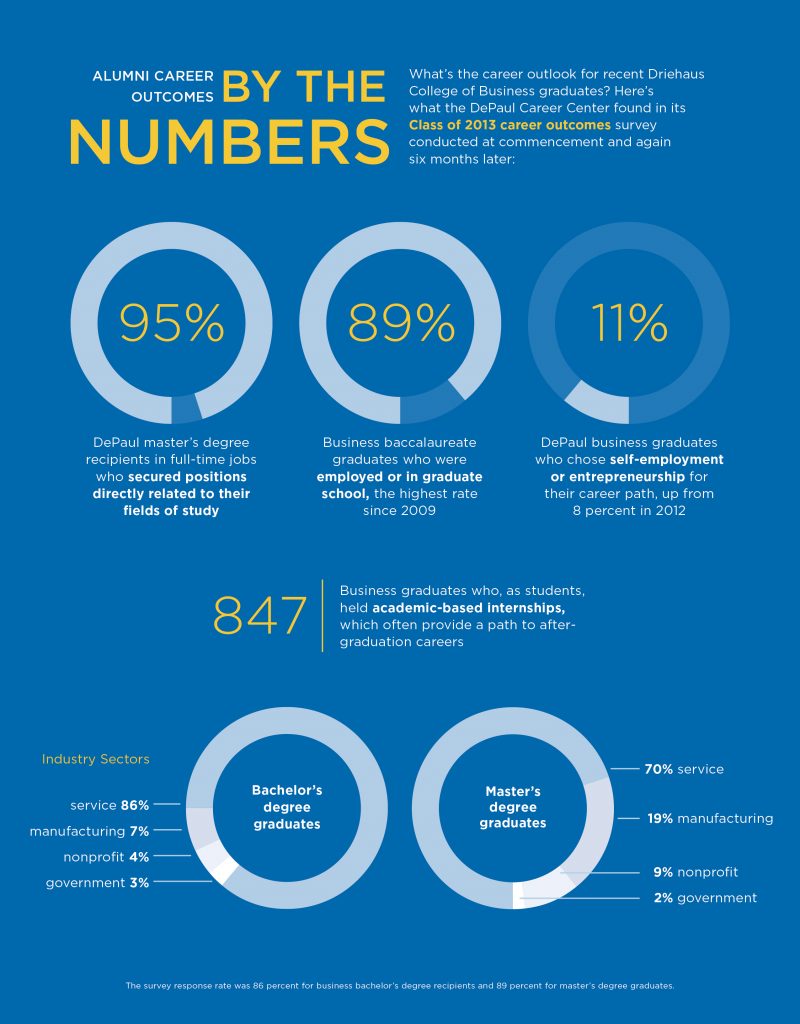

 Bailey Glendenning, CEO of Glendenning Brothers Inc. (MBA ’14)
Bailey Glendenning, CEO of Glendenning Brothers Inc. (MBA ’14) William R. Snow, Managing Director, Jordan, Knauff & Co. (BUS ’89, MBA ’94)
William R. Snow, Managing Director, Jordan, Knauff & Co. (BUS ’89, MBA ’94) Kyle D. Joseph, Executive Director, Foodseum; Founder/CEO ShopGab (MBA ’12)
Kyle D. Joseph, Executive Director, Foodseum; Founder/CEO ShopGab (MBA ’12) Michael Stadnicki, Co-Founder, Launch Franchise Development (BUS ’01, MBA ’11)
Michael Stadnicki, Co-Founder, Launch Franchise Development (BUS ’01, MBA ’11)










